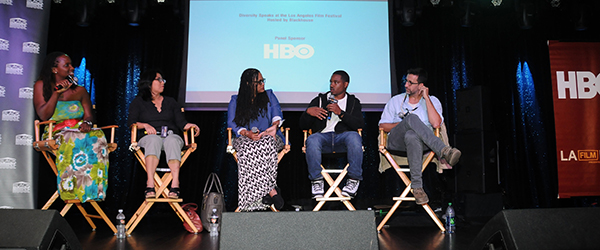LA FILM FEST 2013: The Revolution Has Been Digitized

Diversity Speaks, a series of three LA Film Fest panels showcasing content creators of color on how they combined their passions for storytelling, entrepreneurship and their cultural identities into success. Hosted by The Blackhouse Foundation.
By Aaron Rubin / LA Film Fest Guest Blogger
Featuring a wide array of the hottest African American talent on the web today, the Festival’s Computer Love: Color Adjustment on the Web event highlighted the growing diversity of voices made possible by the growth of the web series.
Moderated by Effie Brown, who serves on the Board of Film Independent and is a successful producer in her own right, the panel focused on the rapidly shifting landscape that video sharing sites like YouTube have offered filmmakers of color. Brown was quick to point out that, in a media world where artists can operate without censors and gatekeepers, there is no one “to tell you wait, stop or maybe later.” When anyone can get millions of eyes on their projects, there is only content and finding the audience.
Saturday’s panel included Issa Rae, the star and writer of the infamous Mis-Adventures of Awkward Black Girl; Dennis Dortch and Numa Perrier, who have collaborated on The Couple and Roomieloverfriends; Asha Kamali May from Milk + Honey; and Al Thompson from Lenox Avenue and Johnny B Homeless, each of whom offered unique perspectives into their creative and business models.
“Think of your project as a show, not a web series. Low budgets, but high standards.”
Issa Rae
Issa Rae was quick to point out one of the most important mindsets to have when making online content: “Think of your project as a show, not a web series.” She extolled the virtues of “keeping everything under our belts as far as production,” adding that one of the most important things they did as filmmakers was think of themselves as “low budgets, but high standards.”
This was quickly reaffirmed by Dennis Dortch, who pointed out that “budget does not equate to success; it’s about ingenuity and creating something worth watching. You could have a $50,000 budget per episode, but without good content no one will watch.”
When asked why he moved to the web series model after writing and directing a critically acclaimed feature, A Good Day To Be Black & Sexy, Dortch said he felt that, while the distribution company did what it could, he thought other models for connecting to his audience would be an even better fit.
Asha Kamali May seemed to hit the strongest chord when she stated that the inspiration for her work was to reclaim the image of black women in America. She noted that before Obama had been elected, she searched Google Images for the phrase “black women” and found that, instead of an array of accomplished individuals who would make her proud, almost all of the results were of hip-hop video vixens. While stating that she has respect for what those women do, Kamali felt there was so much more to explore about African American women than their body parts. This was a sentiment that received audible agreement in the crowd, who were clearly moved by her motivation.
Color Adjustment had one of the most interesting audience-filmmaker Q&A’s at the Festival so far, perhaps because the separation between the filmmakers and audience members was the smallest of any of the major Diversity Speaks panels. The most important lesson for filmmakers looking to end up on the stage next year: hurry up and make your own content already. ASAP!